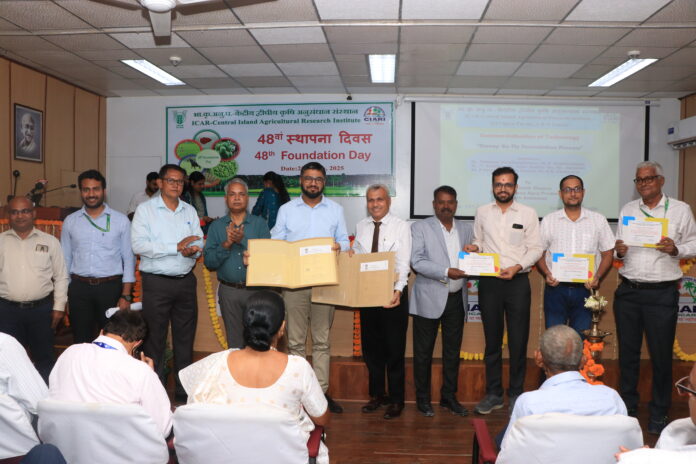Sri Vijaya Puram: The ICAR-Central Island Agricultural Research Institute (ICAR-CIARI) marked its 48th Foundation Day with a blend of scientific exchange, institutional celebration, and collaborative ambition. Held at its campus in Sri Vijaya Puram, the event showcased the institute’s wide-ranging achievements across horticulture, crop science, animal science, fisheries, and natural resource management. The day saw participation from key institutions, researchers, and stakeholders across the island territories and the mainland.
General Manager of NABARD, G Santhanam, attended as Chief Guest and acknowledged ICAR-CIARI’s contribution to research and rural upliftment in the islands. He outlined NABARD’s ongoing developmental role in supporting agriculture and allied sectors, and emphasized the potential for future collaborations between NABARD and ICAR-CIARI. Among the areas highlighted for joint models were rooftop gardening, tribal development, organic farming, and protected cultivation, with the aim of improving rural livelihoods.
Guest of Honour, Aparup Das, Director of ICMR-RMRC, delivered a lecture on the zoonotic origin of malaria in India, exploring the transmission dynamics of the disease between animals and humans. He expressed interest in collaborative work in One Health, medicinal plants, and zoonotic disease management, areas where agriculture, public health, and environment converge.
Director of ICAR-CIARI, Eaknath B. Chakurkar, presented a review of the institute’s recent milestones. Twelve technologies developed by the institute’s scientists were successfully commercialized over the past year, underscoring the institute’s commitment to translational research that benefits local farming communities. Among those, a fly repellent named “Dweep Go Fly”, a synthetic and herbal formulation, was formally licensed to a local enterprise, Mahalasa Agro Products, during the event.
The institute also released 10 new publications, including bulletins and extension folders. Progressive farmers from the Andaman & Nicobar and Lakshadweep Islands were recognized for adopting ICAR-CIARI technologies, while scientists and staff were felicitated for contributions in research, fieldwork, and institutional service. The event also acknowledged the efforts of Krishi Vigyan Kendras in North and Middle Andaman, Nicobar, and the Regional Station at Lakshadweep, all of which play key roles in technology dissemination.
Earlier in the day, dignitaries planted saplings of a dwarf coconut variety and visited exhibitions showcasing the institute’s innovations across sectors. The event was coordinated by scientist Abhilash and subject matter specialist Sushma. Jai Sunder, Head of the Division of Animal Science, opened the programme with a welcome note highlighting key achievements, while principal scientist P.K. Singh delivered the vote of thanks.
The virtual presence of teams from Minicoy, North and Middle Andaman, Nicobar, and officials from other ICAR units further emphasized the institute’s wide collaborative footprint. With a growing emphasis on sustainable agriculture, community outreach, and cross-disciplinary research, ICAR-CIARI appears poised to deepen its impact in the island region and beyond.





